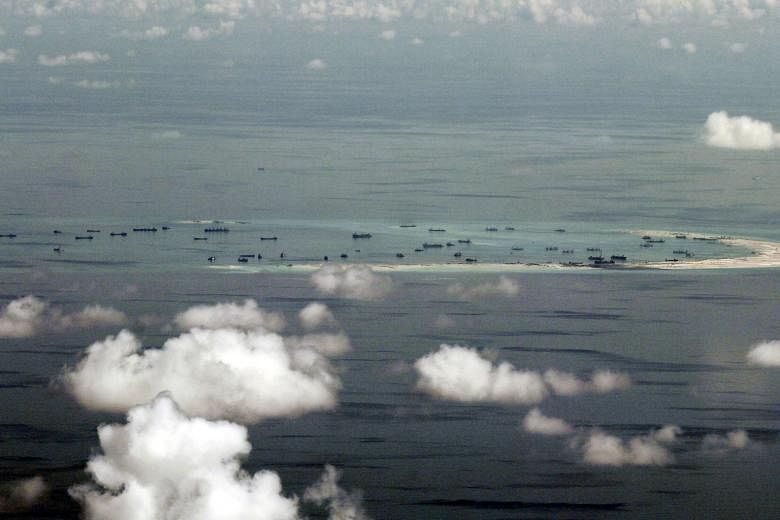China's claims to the South China Sea will come under legal scrutiny for the first time as the Philippines officially begins to press its own case before a United Nations tribunal starting today.
In oral pleadings set to last for at least five days in The Hague, a high-profile team from Manila, led by Solicitor-General Florin Hilbay and Foreign Secretary Albert del Rosario, will argue that the Permanent Court of Arbitration has jurisdiction over the Philippines' case.
In March last year, the Philippines filed a 4,000-page plea alleging that China is claiming areas as far as 1,611km from its borders with its so-called nine-dash line, violating the UN Convention on the Law of the Sea (Unclos).
That line covers 90 per cent of the 3.5 million sq km South China Sea and spreads deep into territories claimed not just by the Philippines but also by Vietnam, Malaysia, Vietnam and Taiwan.
Foreign ministry spokesman Charles Jose has said that if the tribunal decides it has jurisdiction, Manila can then begin to argue the merits of its case in another round of hearings. However, if the five-judge arbitration court rules against the Philippines, "that is the end".
But Philippine officials already in The Hague are confident they have a strong case.
Meanwhile, Beijing has refused to take part in the case, saying it will reject any outcome favouring Manila.
Last December, it released a "position paper" questioning the arbitration court's jurisdiction. It argued that the "essence" of Manila's case is sovereignty.
China insisted that without its permission, the Philippines cannot seek a UN court ruling on sovereignty. It said it has already submitted a declaration, which the UN has accepted, exempting it from compulsory arbitration on matters concerning sovereignty.
In response, Manila filed a 3,000- page document in March that included a 200-page atlas containing detailed information about 49 islands, reefs and other land features in the South China Sea.
Manila is invoking dispute-settlement procedures under Unclos, a system that allows for arbitration even when one side objects and refuses to participate. Unclos does not rule on sovereignty, but it outlines a system of territory and economic zones that can be claimed from features such as shoals, islets, reefs and other outcrops.
Legal scholars outside the Philippines said the UN tribunal appears to be taking an "even-handed approach".
Mr Ian Storey, a South China Sea expert at Singapore's Institute of South-east Asian Studies, told Reuters: "It appears the tribunal panel is bending over backwards to accommodate China's interests and appear even-handed to both the Philippines and China."
The case is also being closely watched by Asian governments and the United States, as tensions rise in the South China Sea, especially in the Spratly archipelago, where China is creating seven artificial islands that will allow its navy to project power deep into the maritime heart of South-east Asia.
Meanwhile in Manila, the Chinese ambassador yesterday urged the Philippines to resume bilateral talks instead of pressing for arbitration. Mr Zhao Jianhua told reporters:"We do not wish to define these disputes as military issues because they are political and diplomatic issues and they require political and diplomatic solutions."

